Related Research Articles

"You're All I Need to Get By" is a song recorded by the American R&B/soul duo Marvin Gaye and Tammi Terrell and released on Motown Records' Tamla label in 1968. It was the basis for the 1995 single "I'll Be There for You/You're All I Need to Get By" from Method Man and Mary J. Blige.
"Pledging My Love" is a blues ballad. It was written by Ferdinand Washington and Don Robey and published in 1954.
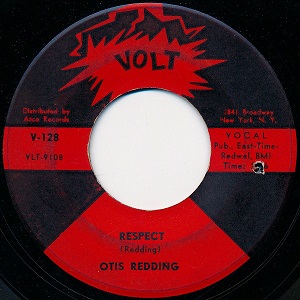
"Respect" is a song written and originally recorded by American soul singer Otis Redding. It was released in 1965 as a single from his third album Otis Blue/Otis Redding Sings Soul and became a crossover hit for Redding. In 1967, fellow soul singer Aretha Franklin covered and rearranged "Respect", resulting in a bigger hit and her signature song. The music in the two versions is significantly different, while a few changes in the lyrics resulted in different narratives around the theme of human dignity that have been interpreted as commentaries on traditional gender roles.

"I Say a Little Prayer" is a song written by Burt Bacharach and Hal David for Dionne Warwick, originally peaking at number four on the U.S. Billboard Hot 100 pop singles chart in December 1967. On the R&B Singles chart it peaked at number eight.

"Freeway of Love" is a song by American singer Aretha Franklin. It was written by Jeffrey Cohen and Narada Michael Walden and produced by the latter for her thirtieth studio album Who's Zoomin' Who? (1985). The song features a notable contribution from Clarence Clemons, the saxophonist from Bruce Springsteen’'s E Street Band. Sylvester, Martha Wash, and Jeanie Tracy provided backup vocals on "Freeway of Love".
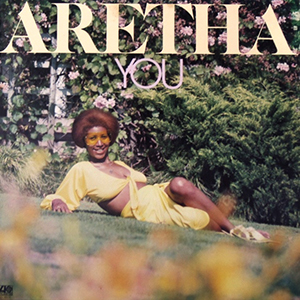
You is the twenty-second studio album by American singer Aretha Franklin, released on October 16, 1975, by Atlantic Records.
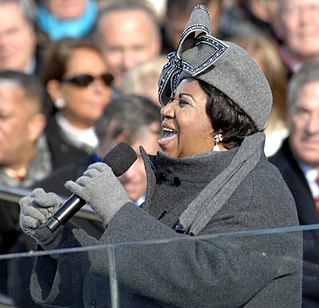
This discography documents the releases of albums and singles by Aretha Franklin. Widely regarded as the "Queen of Soul", she has sold over 75 million records worldwide, making her one of the best-selling R&B female artists of all time. Billboard ranks her as the 34th Greatest Artist of all time. Franklin has scored 73 entries on the Billboard Hot 100, the most among women for nearly 40 years until Nicki Minaj passed her in 2017. Billboard listed her as the 41st Top Gospel Artist of the 2010s. She has accumulated 20 No. 1 hits on Billboard's Hot R&B/Hip-Hop Songs.

"Until You Come Back to Me " is a song written by Morris Broadnax, Clarence Paul, and Stevie Wonder. The song was originally recorded by Stevie Wonder in 1967, but his version was not released as a single and did not appear on an album until 1977's anthology Looking Back. The best-known version of this song is the 1973 release by Aretha Franklin, who had a million-selling top 10 hit on Billboard charts. The song reached No. 1 on the R&B chart and No. 3 on the Hot 100 chart in 1974. It became an RIAA Gold record.
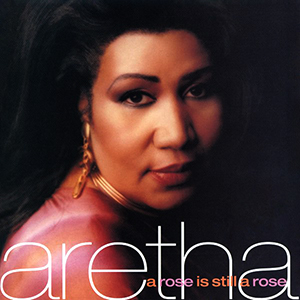
A Rose Is Still a Rose is the thirty-fourth studio album by American recording artist Aretha Franklin. It was released on March 10, 1998 by Arista Records. Conceived after a longer hiatus and a complete departure from her previous studio album What You See Is What You Sweat (1991), the album includes influences of 1990s hip hop as well as modern-day contemporary R&B and soul music. Throughout the project, Franklin worked with many famed hip hop producers and rappers, such as Lauryn Hill, Sean "Puffy" Combs, Jermaine Dupri, and Daryl Simmons. With the latter acts producing most of the album, A Rose Is Still a Rose deviated from the adult contemporary sound of Franklin's older work.
"I Never Loved a Man " is a 1967 single released by American soul singer Aretha Franklin. Released on Atlantic Records, as the first big hit of her career, it became a defining song for Franklin, peaking at number one on the rhythm and blues charts and number nine on the pop charts. The B-side was "Do Right Woman, Do Right Man". Before this Franklin had placed only two Top 40 singles on the pop chart during her modest tenure with Columbia Records.

"It's My Turn" is a 1980 song used as the theme to the film of the same name. The song, written by Carole Bayer Sager (lyrics) and Michael Masser (music) for Diana Ross, was released as the film's soundtrack single on September 29, 1980, by Motown. It became a top ten hit on the Billboard Hot 100, peaking at number nine, and at number 14 on the soul chart. "It's My Turn", likewise, peaked at number nine on the Adult Contemporary chart. The song was used as the theme song of Philippine drama anthology Coney Reyes on Camera in 1984.
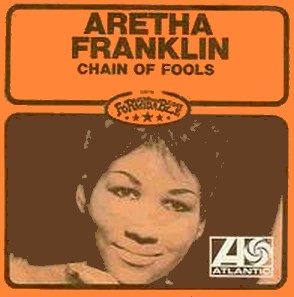
"Chain of Fools" is a song written by Don Covay. Aretha Franklin first released the song as a single in 1967 and subsequently it appeared on many of her albums. It hit number one on the Billboard Hot Rhythm & Blues chart and number two on Billboard's Hot 100 chart. In the lyrics, the singer has been with her boyfriend for five years but realizes she's one of his "chain of fools," women with whom he's been cheating. Others tell her to leave him, but she says his love is too strong and she's too weak. Yet someday, she predicts the chain will break.

"Baby I Love You" is a popular song by R&B singer Aretha Franklin. The only single release from her Aretha Arrives album in 1967, the song was a huge hit, peaking at #4 on the Billboard Hot 100 Singles chart and spending two weeks at number-one on the Hot Rhythm & Blues Singles chart. It was featured in Martin Scorsese's 1990 film Goodfellas. A live recording featured on the album Aretha in Paris (1968). There have been several other famous musicians who have covered Aretha Franklin's "Baby I Love You", such as Lisa Marie Presley in 1989, Donny Hathaway, Roberta Flack in 1972, B.B. King, The Bar-Kays in 1971, Erma Franklin in 1969, Irma Thomas in 1988, and Otis Rush in 1969 and various other musicians. In 2012, Christine Anu covered the song on her album, Rewind: The Aretha Franklin Songbook.
"Share Your Love with Me" is a song written by Alfred Braggs and Deadric Malone. It was originally recorded by blues singer Bobby "Blue" Bland. Over the years, the song has been covered by various artists, most notably Aretha Franklin who won a Grammy Award for her 1969 rendition. Other artists who covered the song include The Band in 1973, Kenny Rogers in 1981, and most recently, Van Morrison in 2016.
"I Wonder" is a 1944 song written and originally performed by Pvt. Cecil Gant. The original version was released on the Bronze label, before Gant re-recorded it for the Gilt-Edge label in Los Angeles. The record made it to number one on the Juke Box Race Records chart and was Pvt. Gant's most successful release. In February 1945, pianist, Roosevelt Sykes hit number one with his version of the song. Roosevelt Sykes version is notable in that it replaced Pvt. Gant's version, at number one on the Juke Box Race Records chart.
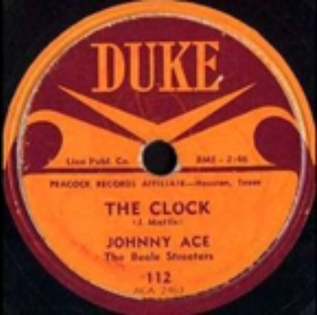
"The Clock" is a 1953 song by Johnny Ace with the Beale Streeters. It describes a man feeling lonely while he watches the clock. "The Clock" was Johnny Ace's third release to reach the U.S. R&B chart and second number one.
"So Long" is a song written by Remus Harris, Russ Morgan and Irving Melsher in 1940 and later recorded by Russ Morgan and his orchestra.
"Never Let Me Go" is a blues ballad song by American R&B/blues singer Johnny Ace, written by Joseph Scott and released in 1954 under Duke Records. The song is featured on the albums My Songs and Memorial. "Never Let Me Go" was one of his eighth consecutive top ten R&B hits in a row, including "My Song", "Cross My Heart," "Please Forgive Me," "The Clock," "Pledging My Love," "Saving My Love for You," and "Anymore". The song was R&B hit and peaked to No. 9 in October 1954 on Billboards Rhythm & Blues Records chart.
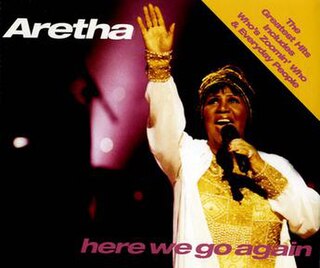
"Here We Go Again" is a song by American singer Aretha Franklin. It was written by Trina Broussard, Jermaine Dupri and Trey Lorenz for Franklin's thirty-fourth studio album A Rose Is Still a Rose (1998), while production was helmed by Dupri and Manuel Seal. The song is built around replayed portions of "The Glow of Love" (1980) by Italian-American post-disco group Change. Due to the inclusion of the sample, Mauro Malavasi, David Romani and Wayne K. Garfield are also credited as songwriters. The song was the second single released from A Rose Is Still a Rose in June 1998 and reached number 76 on the Billboard Hot 100, also becoming Franklin's fifth number one on the US Dance Club Songs.

30 Greatest Hits is a 1985 Aretha Franklin's compilation album. The album chronicles majority of Franklin's hit singles during the Atlantic Records era from 1967 up to 1974. Following Franklin's death, the album entered the top ten of the Billboard 200 albums chart at number seven, in the week ending on August 25, 2018 earning 52,000 units with 18,000 of that were traditional sales. It climbed one spot higher on the following week, becoming Franklin's highest-peaking compilation album in the United States.
References
- ↑ Whitburn, Joel (2004). Top R&B/Hip-Hop Singles: 1942-2004. Record Research. p. 22.
- ↑ Aretha Franklin, "My Song" Chart Positions, Musicvf.com, Retrieved September 21, 2013